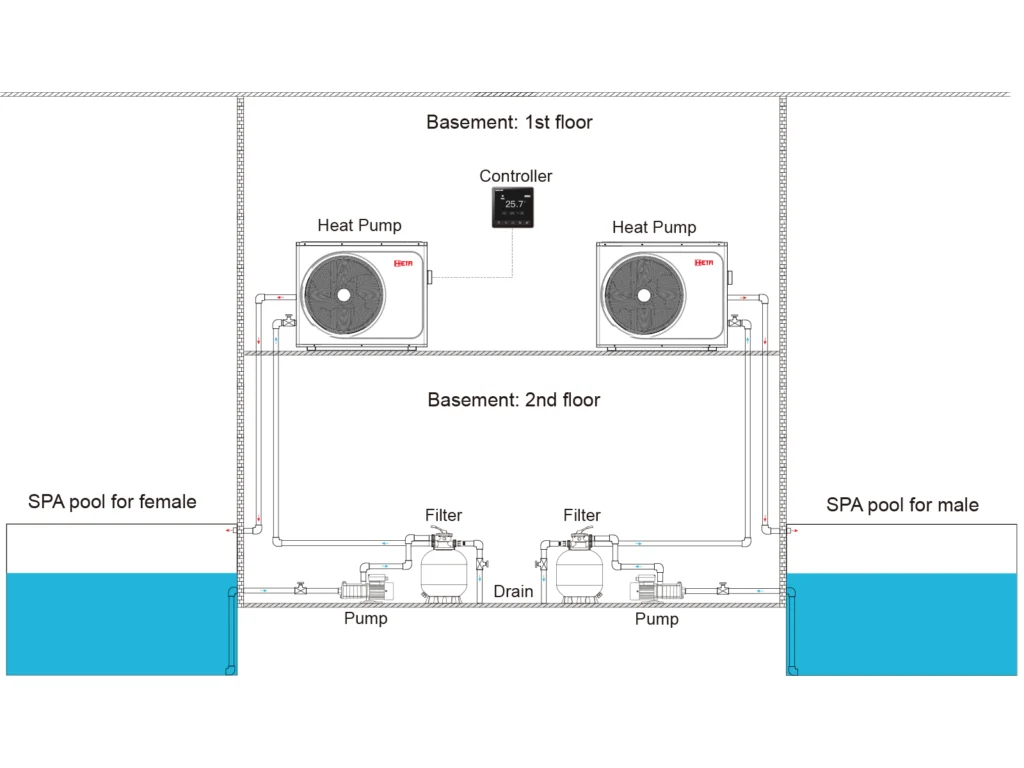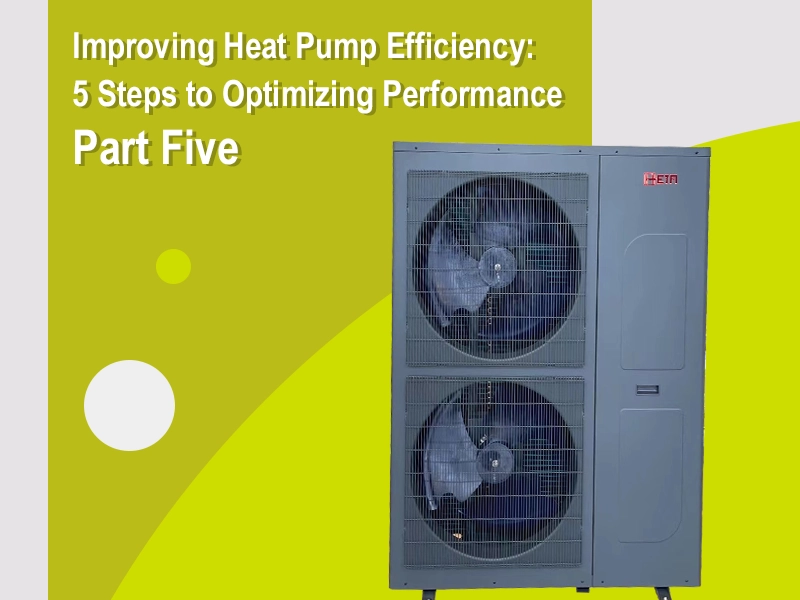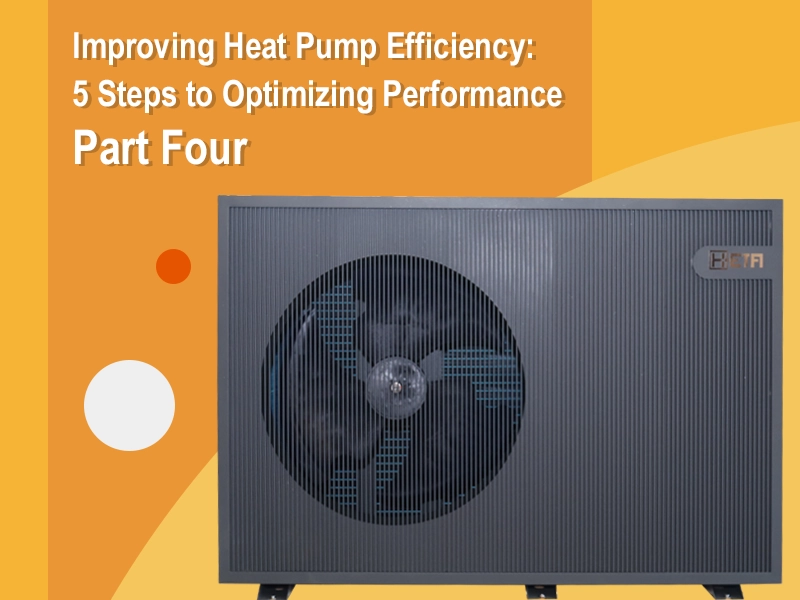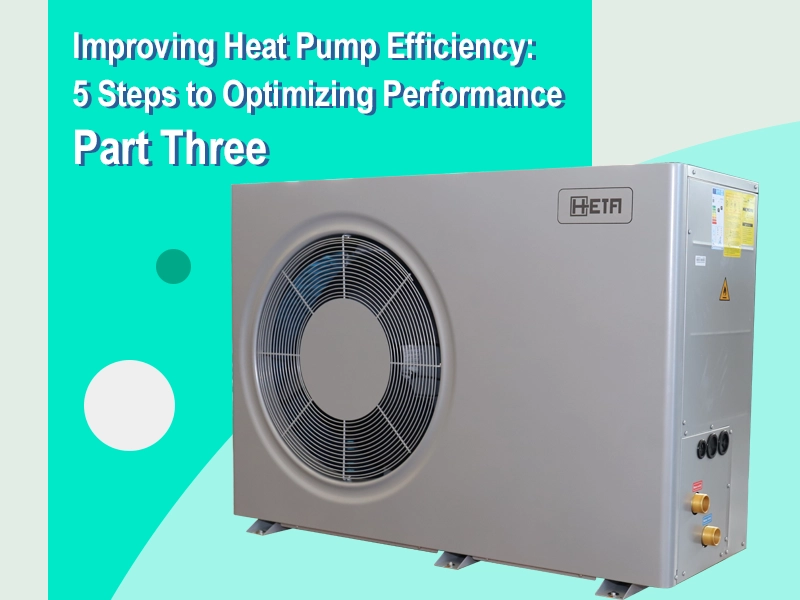🗓️ Date: January 2nd 2024
🏡 Location: New village of overseas Chinese in Guangzhou
👷 Partner: Professional Pool Heat Pump Installation Company
🔍 Installation Process Overview
We accompanied a professional pool heat pump installation team to Guangzhou Huaqiao New Village to witness their installation process at the customer’s residence.
Installing a heat pump for a spa pool or swim spa typically involves several steps to ensure proper functioning and safety:
- Select the Right Heat Pump: Choose a heat pump that’s suitable for the size of your spa or swim spa. Consider factors like the volume of water to be heated and the climate in your area.
- Location: Find an appropriate location for the heat pump. It should have enough space around it for proper airflow and maintenance access. Ensure it’s close enough to the spa or swim spa for plumbing connections.

- Plumbing Connections: Connect the heat pump to the spa’s plumbing system. This usually involves attaching the intake and return pipes to the heat pump. Follow the manufacturer’s guidelines for proper sizing and connection.


- Electrical Connection: Ensure the heat pump is connected to a suitable power source according to the manufacturer’s specifications. This might involve hiring a qualified electrician to handle the electrical connections.


- Positioning and Mounting: Mount the heat pump securely on a level surface. Make sure it’s properly aligned and positioned according to the manufacturer’s guidelines to avoid vibration and ensure optimal performance.
- Airflow: Ensure there’s adequate airflow around the heat pump. Trim back any vegetation or obstacles that might obstruct airflow to the unit.
- Testing and Commissioning: Once the installation is complete, test the heat pump to ensure it’s functioning correctly. Check for leaks, verify the temperature settings, and make any necessary adjustments.
- Regular Maintenance: Follow the maintenance schedule outlined in the heat pump’s manual. This might include cleaning the filters, inspecting the unit, and scheduling professional servicing at recommended intervals.


fiberglass sand filter
The installation team had been working continuously for two days. On January 2nd, we joined them for the final phase of installation, which included plumbing connection, electrical connection, and debugging of the heat pump water heater to ensure the equipment’s smooth operation.
🏠 Customer Environment and Requirements

Regarding equipment selection, based on the provided SPA pool capacity, we suggested a 7kW SPA heat pump for the customer.


The client’s two SPA baths are located in the basement, separated by a water and electricity systems room. The customer desired the heat pump to be installed in the storage room on the basement floor directly beneath the water and electricity systems room. They wished for year-round operation, providing hot baths in winter and cool air during summer to create a comfortable dining environment for guests. However, the optimal efficiency of the heat pump relies on good airflow, making outdoor installation preferable. We previously highlighted this installation consideration in our article “Pool Heat Pump Installation Guide“. For those interested, you can find more information via the following link:
Pool Heat Pump Installation Guide
https://hetapro.com/pool-heat-pump-installation-guide/

It can be seen from the walls on both sides of the water and electricity system room that the customer used to use ordinary electric spa heater. It looks very old and must have been out of use for a long time. Electric spa heaters and heat pumps are two distinct systems used to heat water in spas or pools, each with its advantages and considerations.
1. Electric Spa Heaters:
– Efficiency: Electric spa heaters are known for their rapid heating capability. They use electric resistance to generate heat quickly and are suitable for smaller spas or when immediate heating is required.
– Installation: They are relatively easy to install and can be a standalone heating solution for smaller setups.
– Operating Cost: While efficient in heating quickly, electric spa heaters tend to have higher operating costs, especially in regions where electricity prices are high. They might not be the most cost-effective option for continuous heating in larger spas or pools.
– Size Consideration: They are compact and suitable for installations where space is limited.
– Maintenance: Generally, they require minimal maintenance compared to some other heating systems.
2. Heat Pumps:
– Efficiency: Heat pumps operate differently; they extract heat from the surrounding air and transfer it to the water. They are highly efficient for maintaining water temperature rather than rapidly heating it.
– Energy Efficiency: Heat pumps are more energy-efficient than electric heaters, especially in moderate climates, as they do not generate heat but move it from one place to another.
– Initial Cost: Heat pumps typically have a higher initial investment compared to electric heaters, but they usually result in lower operating costs in the long term due to their energy efficiency.
– Space Requirement: They might need more space for installation due to their size and need for proper air circulation.
– Climate Dependency: Heat pumps’ efficiency can be affected by climate; in colder climates, they might struggle to extract sufficient heat from the air, leading to reduced efficiency.
When choosing between the two, consider factors like the size of the spa, the desired heating speed, operating costs, initial investment, available space for installation, and the local climate. Electric spa heaters are ideal for quick, smaller-scale heating, while heat pumps offer energy efficiency and are suitable for continuous heating in larger setups, especially in moderate climates.
Despite recommending outdoor installation for better performance, the client insisted on basement installation. Therefore, we advised clearing obstructions in the air inlet area to enhance the installation environment.

🛠️ Final Installation Tasks
On this day, the installation team completed tasks such as plumbing connection, electrical connection, and system debugging for the heat pump water heater. They conducted these activities meticulously to ensure proper equipment installation and smooth operation.

💡 Professional Debugging
Thorough system testing and adjustments were conducted by the installation team to ensure the heat pump system’s efficient operation and stable water temperature, meeting the client’s requirements.

📸 Real-Time Sharing
We provided real-time updates from the site, showcasing crucial steps of the installation process and the team’s professional expertise. These insights will be shared on our social media platforms, so stay tuned!
🤝 Appreciation for our Partner
We extend our sincere appreciation to the diligent team of professional pool heat pump installers for delivering outstanding service and a pleasant installation experience to our client.
🌟 Professionalism and Equipment Selection Advice
Pool heat pumps play a vital role in maintaining water temperature and comfort. Proper selection is crucial. As a general guideline, a small SPA bath (up to 2500 liters) may require a 7kW heat pump, while a medium-sized SPA bath (2500 to 7000 liters) might necessitate a 9kW heat pump. Larger spa pools or swimming centers (with capacities exceeding 7000 liters) may require an 11kW or higher power-rated heat pump.
Furthermore, insulation, location, usage patterns, and climatic conditions also impact heat pump selection. Therefore, we recommend consulting with professionals to evaluate the model selection based on specific needs.
This installation case demonstrates the skills and commitment of our professional team, providing customers with a reliable pool heat pump solution. We strive to share more installation cases and offer professional services and expertise to our community!
Foshan Hetapro HVAC Equipment Co., Ltd
Website: www.heatpro.com
Phone: 86-18676527809
Email: brian@hetapro.com



